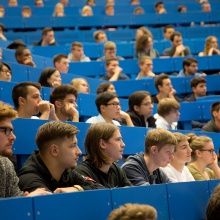Teaching Archive
- Advanced Atomic Physics II
- Modern Topics in Atomic Physics
- Non-Linear Optics
- Advanced Atomic Physics I
- Linar Optics
- Grundlagen der Experimentalphysik IV - Atome und Kerne (offered in German)
- Advanced Atomic Physics II
- Modern Topics in Atomic Physics
- Non-Linear Optics
- Physikalisches Hauptseminar: Quantum simulation and -computing with ions and neutral atoms
- Advanced Atomic Physics I
- Grundlagen der Experimentalphysik III - Optik, Teilchen und Wellen (offered in German)
- Linar Optics
- Grundlagen der Experimentalphysik IV - Atome und Kerne (offered in German)
- Advanced Atomic Physics II
- Modern Topics in Atomic Physics
- Non-Linear Optics
- Advanced Atomic Physics I
- Grundlagen der Experimentalphysik III - Optik, Teilchen und Wellen (offered in German)
- Linare Optik
- Advanced Atomic Physics II
- Modern Topics in Atomic Physics
- Non-Linear Optics
- Physikalisches Hauptseminar: The Physics of Climate Change
- Advanced Atomic Physics I
- Linare Optik
- Advanced Atomic Physics II
- Physikalisches Hauptseminar: Extremes in Atomic Physics
- Non-Linear Optics
- Advanced Atomic Physics I
- Linare Optik
Physics Didactis Research courses
Courses conducted by our Physics Didactics Research group are offered in German language. For details please switch to the German version of this website.
Final Theses at PI5
If you are interested in joining the institute for your final thesis project you are welcome to browse our list of topics currently on offer.
A list of theses completed at PI5 is also available.
Contact

5. Physikalisches Institut
Administration


